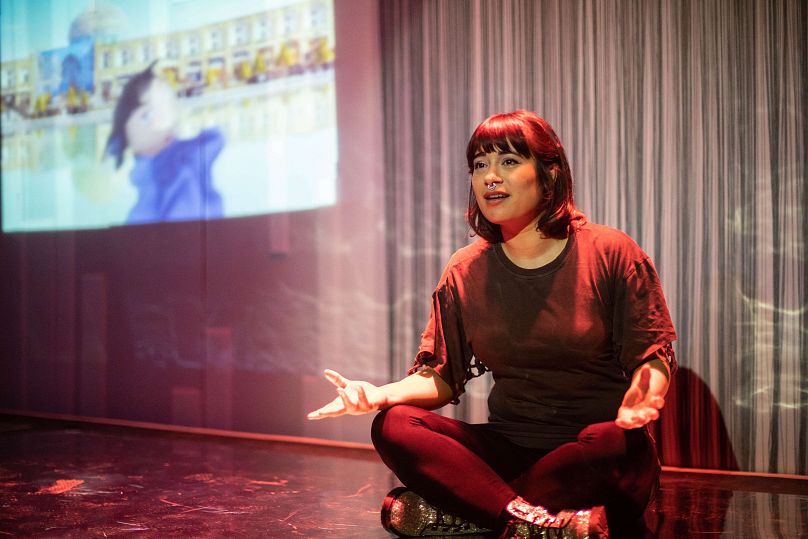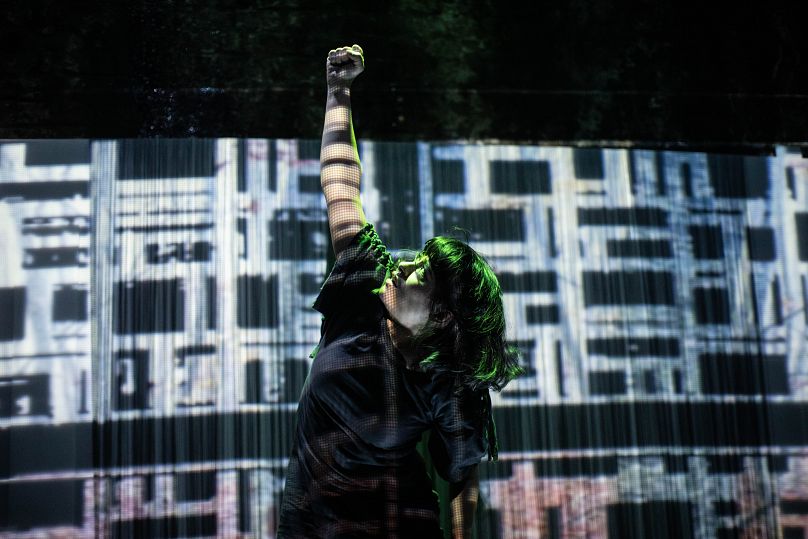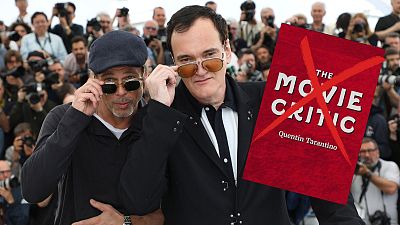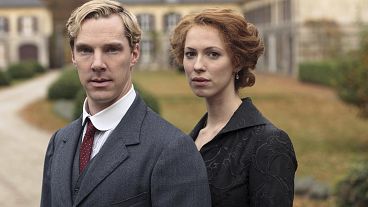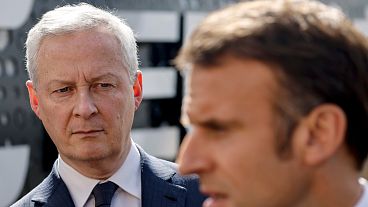Peyvand Sadeghian will soon star in shows on Netflix and Amazon Prime, but how did her childhood in Iran shape her career?
To mark World Refugee Day 2022, Euronews Culture is telling the stories of refugee artists and performers in Europe.
The worst birthday of Peyvand Sadeghian’s life? When she turned 11 years old during an extended stay in Iran.
“My family tried to make it nice, but it didn’t really work,” says the actor and theatre director and performer.
At 10 years old, Sadeghian’s father had taken her to Iran to visit her extended family, he’d been separated from them when he fled the Islamic revolution aged 17.
Arriving in the UK as a minor, Sadeghian’s dad had settled and had a family, eventually getting her and her sister UK citizenship.
One day Sadeghian’s father decided to take her to meet her family in Iran.
Despite her dad’s obvious discomfort at telling her she would have to wear a headscarf when they arrived, Sadeghian was excited to see her family’s home country and meet her grandparents.
“I had never been abroad. I was just excited to be on a plane … I was excited about all the amazing food,” she says. “I didn’t have a sense of the gravity of it really.”
Stranded in Iran as a dual national
A new reality sunk in as she stepped off her flight though as the bloodline nationality laws in Iran didn’t recognise her British naturalisation.
Sadeghian was forced to get a new Iranian passport and a new name, Parisa.
“There were lots of things that I didn’t understand or get my head around. What do you mean I’m not British?” says Sadeghian.
“Nobody was talking to me or being straightforward with me,” she adds. “I was hearing conversations and trying to piece together what was going on.”
For over a year she was stranded in an effectively alien country. Her father was arrested and the UK government ignored her case.
Throughout her stay in Iran Sadeghian had her bags packed, ready to leave at a moment’s notice.
Refugee: Discovering a part of myself
Sadeghian eventually made it back to the UK but it wasn’t until she was 18 that Sadeghian truly understood the implications of what had happened, or the causes behind it.
Now in her 20s, she looks back on her time there with a mixture of confusion and bemusement, a child in an adult world, where even the grown-ups were hamstrung by the Iranian state.
“It wasn’t until I got my own passport that I looked at this paperwork saying I was a refugee, saying I didn’t have the right to work even though I was a child, and saw the naturalisation papers,” she says.
“It was something that was never really talked about.
“It was a very strange experience of discovering a part of yourself that you weren’t aware of.”
This realisation that bits of paper and the powerful interstate relationships they represent can shape a life has fed into Sadeghian’s work.
Now a star on the rise, how does this history affect Sadeghian’s career in theatre?
What it means to be both British and Iranian
'Dual’ her 2020 theatre show, which is soon to be revived and back on the road, tells the story of her time in Iran and the effects it had on the rest of her life.
It’s left her with a lasting distaste for the fates of individuals being dictated by geopolitics.
“You’re at the whim of whatever relationships are being tended to at the top, I find it quite disgusting,” she says.
‘Dual’ was attended by many immigrants and refugees, opening up conversations about the difficulties of gaining settled status and being mired in bureaucracy.
Sadeghian’s distinctive voice is in some ways a reaction to the silence surrounding her childhood experiences, and the irony of making art about an oppressive regime under which she would never be able to be so expressive isn’t lost on her.
“I was really quite touched, this is a conversation that people aren’t really getting to have with each other,” she adds.
Multimedia practice for a sensorial stage experience
Sadeghian uses many methods to communicate her vision, which is usually well researched from conversation, academic articles, and books before she begins to create.
“I’m quite an all-over-the-place maker really. I gather that material together and then I work back from that in terms of the form,” she says.
Over a career in which she’s faced the barriers of being mixed-race and working-class, Sadeghian has picked up an impressive arsenal of skills that she can use to engage audiences in complex ideas.
Her work often has a multimedia bent, involving puppetry or mediums to represent social media.
In a collaborative project called ‘Rich Kids: A History of Shopping Malls in Tehran,’ Sadeghian represented Instagram on stage to show the 'rabbit holes' people can go down in the privately public world of their phones. ‘
Dual’ even included voice notes from her dad, who now lives in China.
“I think he’s happy that I’m making work about this subject matter, but also it was quite difficult for him to talk about this without ranting and raving,” she adds.
Netflix, Amazon Prime and beyond
After years of struggling with the financial burden of an early career in acting, Sadeghian has found her way onto screen in shows which will soon make her a familiar face.
Her upcoming projects include a part in a ‘Bridgerton’ spin-off on Netflix which tells the origins story of the iconic prime mover Queen Charlotte, while Sadeghian is also a cast member in Amazon Prime’s adaptation of the best-selling feminist allegory ‘The Power’.
However, despite soon finding widespread renown, the actor is refreshingly down to earth, which is perhaps the reason her work is so relevant.
“There are things creeping in the UK and it is really important to be aware of that and not constantly patting ourselves on the back,” says Sadeghian.
But even as her star rises, the creative mind can never quite let go of her childhood in Iran.
“I often think what if I didn’t leave what would that version of life look like?” she says.
